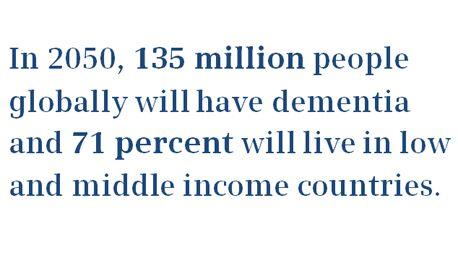
January 30, 2014 | The G8 dementia summit convened in London on Dec 11, 2013 put dementia on the global stage next to other major killers such as cancer, heart disease, and HIV/AIDS. The statistics are alarming.
An article by Alysia Battersby

As global populations grow older, the number of individuals living with dementia worldwide is increasing at an alarming rate and is expected to treble to 135 million by 2050. Bringing together leading health ministers at the G8 dementia summit in London on December 11, 2013, UK Prime Minister David Cameron called for international action to conquer dementia, for which there currently is no cure. Dementia is caused by nerve cell death and involves deterioration in mental functions including memory, language, orientation, and judgment. As brain functions waste away, individuals living with dementia sooner or later require full-time care. “Dementia steals lives, it wrecks families, it breaks hearts,” said Mr. Cameron, who wants the UK to lead the international community in its fight against this condition.

AIDS-style battle
Finding a cure for dementia will require extreme international collaboration on a scale matching the global HIV/AIDS campaign initiated 25 years ago.Campaign veteran Dr. Paul Stoffels of Janssen Pharmaceutica explained, ”The life expectancy of people living with HIV has gone from two years to a normal lifespan minus 2 years. That means gaining 20, 30, 40, 50 years of life by scientific technical intervention.“ Encouragingly, by the close of the conference, G8 health and science ministers had committed to developing a coordinated international research action plan and developing a cure or disease-modifying therapy for dementia by 2025.

Dr. Francis Collins on acceleration in the science of dementia
Without a doubt, the breakthrough cure will have to come from science. Looking back at the HIV/AIDS campaign, Dr. Stoffels believes its success came down to three major strategies: an emphasis on understanding the disease course to develop therapeutic targets, the use of biomarkers to monitor disease progression, and the rapid shift to combination therapy in clinical trials. Much of this lies ahead in the fight against dementia because the basic science remains underdeveloped. We know too little about the causes and mechanisms by which neurons die in neurodegenerative diseases. However, Dr. Francis Collins of the US National Institutes of Health assured the G8 audience that the science of dementia is accelerating. Our fundamental understanding of the brain is growing rapidly, aided by the Human Brain Project in the EU and the Brain Initiative in the USA. Pre-clinical insights about dementia are increasing. Most prominently, genetic risks of Alzheimer’s disease have been discovered in genome-wide association studies and reveal that inflammation plays a role. Remarkable advances in induced pluripotent stem cells have given us cell-culture-based disease models for studying the molecular difference between healthy and diseased neurons, without putting patients at risk. Finally, new biomarkers and the ability to image the Alzheimer proteins beta-amyloid, and more recently tau, will facilitate the study of early disease progression and treatment response.

Dementia clinical trials
Advances in pre-clinical studies must be matched by global clinical trials with innovative design. Failed clinical trials have taught researchers the need to focus on people who are asymptomatic but are known to be at very high risk on the basis of their genes. Going a step further, Dr. Edo Richard from the University of Amsterdam suggested enrolling large populations at intermediate risk as opposed to small populations at high risk. Another idea put forward by Dr. Stoffels was to take advantage of being able to reduce the placebo population to 25 percent when trialing drug combinations.

Importance of big data on dementia
As part of improving strategies for pre-clinical and clinical research in dementia, G8 delegates unanimously, albeit cautiously, embraced the potential of big and broad data. Databases of behavioral, genetic, and clinical data on dementia would add a powerful collective resource for research and evaluation in dementia care. However, this would require robust governance frameworks to allow data to be shared globally without compromising privacy, safety, security, and commercial interests. Along similar lines, Dr. Collins stressed the need for collaboration and coordination, showcasing the International Alzheimer's Disease Research Portfolio project as an exemplary effort to collate existing research portfolios using a common language and classification system.
G8 dementia summit legacy
Many agreed with Professor Simon Lovestone of King’s College London, who said that the G8 dementia summit was the most significant event since Alois Alzheimer first described the disease and made it visible to the world. After the dust has settled, people living with dementia will still be watching. One of these people is Dr. Peter Dunlop, who was diagnosed with Alzheimer’s disease four years ago when he was in his mid-50s. He concluded his bold speech at the G8 summit by saying, ”I’m sure you won’t let us down.”
Management Summary
Challenge:
- The number of people living with dementia is increasing worldwide and expected to treble to 135 million by 2050. There is currently no cure for dementia.
Solution:
- G8 ministers at the dementia summit committed to developing an international action plan for research and finding a cure or disease-altering therapy by 2025.
Result:
- Intense international collaboration will be required to understand the cause of neurodegeneration in dementia, improve its early detection, and move towards a cure.
Author’s Bio
Dr. Alysia Battersby, PhD, director of BioMedWord, is a medical and scientific writer with over 10 years of scientific research experience. She has authored, edited, and proofread manuscripts published in peer-reviewed journals and has communicated topics in life sciences to specialized audiences (talks, posters, and abstracts at conferences) and to the lay public (radio interviews and university open days).

